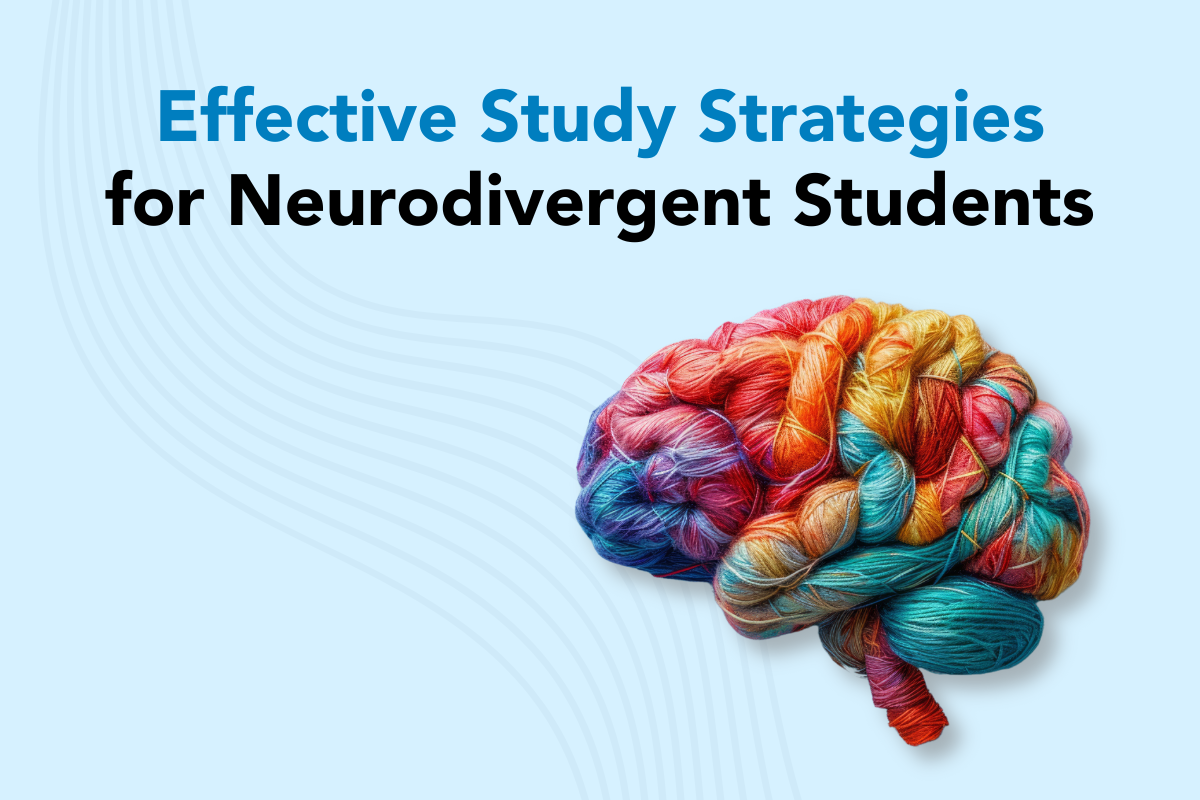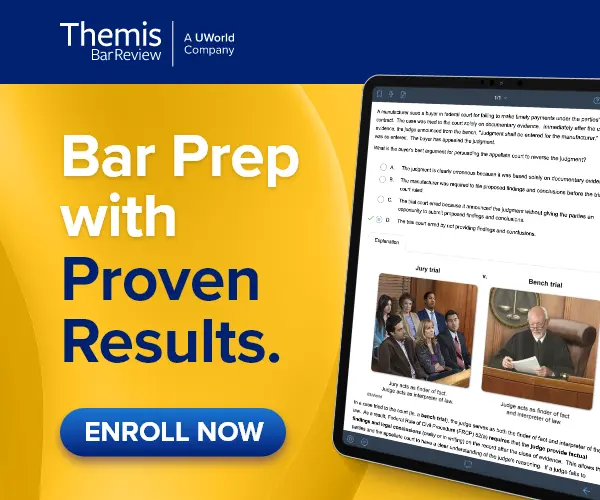Best Study Strategies for Neurodivergent Law Students
Navigating law school is challenging for any student, and finding study strategies that cater to your learning style plays a critical role in meeting that challenge. However, for the 25% of law students who identify as neurodivergent, traditional study methods simply aren't optimized.
Fortunately, many have been where you are and succeeded with study methods better suited to neurodiverse students. We're excited to share our recent webinars — featuring a current law student preparing for the bar exam and successful neurodivergent lawyers, including Professor Heather Varanini, Golden Gate University's Director of Academic Achievement — that discuss:
- Study strategies optimized for the neurodiverse
- Themis features that complement these strategies
- How to build stamina and prepare for exam day with simulated exams
- Optimizing your study schedule
Read on for curated advice from our panelists, or request to have both webinar recordings emailed to you.
Meet the Panelists
What is Neurodivergence?
Just as people have different body types, heights, and eye colors, brain function and behavioral traits also vary. Neurodiversity refers to the idea that these variations are part of the natural diversity of human brains rather than pathological deficits. Some common examples of cognitive and neurological differences include:
- Autism spectrum disorder (ASD)
- Attention deficit hyperactivity disorder (ADHD)
- Dyslexia
- Tourette syndrome
- Obsessive-compulsive disorder (OCD)
- Sensory processing disorder (SPD)
- Anxiety disorders
- Depression
"Neurodiversity refers to the different ways people experience and interact with the world. This includes conditions like ADHD, autism spectrum disorder, dyslexia, and mental health conditions such as bipolar disorder and OCD. Recognizing and destigmatizing these differences is crucial for creating an inclusive learning environment."
- Professor Heather Varanini

What are some effective study strategies for neurodivergent students?
Take Regular Breaks
"If you're not taking breaks and you just push yourself for a week, no breaks, studying from when you wake up until you go to sleep, then after a certain amount of days you're going to burn out, and it's going to take you longer to recover. Whereas if you’re building in breaks as you go, then instead of hitting these dramatic peaks and lows, you get more consistent energy.”
-Erin Lindsey
Create a Routine
"I had a very strict schedule for myself. I'd wake up, I'd watch Brad Mondo on YouTube while I ate, and then I went into studying with a hard stop time. So even in July, even when it was ‘go’ time, I would always have a hard stop at 7 p.m. or 8 p.m. because I knew I needed that break.”
-Meagan Robinson
Find Resources that Work for You
"Those fill-in-the-blank lecture handouts were the one thing that kept me focused on those lecture videos. And the Themis videos are in such short chunks that you really can say, OK, I'm going to watch, I don't know, 2 or 3 lecture chunks, which will be about an hour roughly. And then I'm going to take a 15-minute break.”
-Rebecca Petrilli
Handwrite Notes
"The act of writing ... Once I started doing that, the memorization of the law came to me so much faster. And then when I realized that was working for me, I started actually hand-copying sections of the Themis final review outlines into that notebook."
-Rebecca Petrilli
Simulate the Exam
"The goal of the simulated exam is multi-faceted. What does it feel like to test for that long? What does it feel like to keep your brain engaged? For 12 hours or maybe even a little bit longer if you're in a state-specific jurisdiction. And what does it feel like to do all of that in such a condensed time frame?"
-Heather Varanini
Make Small Adjustments
"Once a week, during your bar study process, ask yourself: What did I do this week? How did I study? Where was I successful? What study methods served me really well? And what didn’t? Where did I feel really distracted? What made me lose focus? Make small shifts.”
-Rebecca Petrilli
Prioritize Self-Care
"You still want to keep having a bit of balance in terms of making sure you're getting movement in your day. So you don't want to stop exercising, stop sleeping, stop eating. You still need to do all the things that help you stay sane and stay calm so that you're not super stressed and anxious when it comes around to the actual exam."
-Heather Varanini
Find Balance
"Outsource your help. Order groceries for pickup instead of going to the store. Send kids to spend time with their family. Wherever you can, remove additional responsibilities in your life. And, have honest conversations with your partner, with your mom and dad, with your roommates."
-Heather Varanini
Build a Support System
"I found a friend to study with every day. One friend, not a big group. We would go there every single day, to a little table in the back of a coffee shop."
-Rebecca Petrilli
Recent Posts
How to Recover After a Difficult Law School Semester
Best Study Strategies for Neurodivergent Law Students
7 Highly Effective Memorization Techniques for the Bar Exam
7 Legal Writing Tips for Law Students
The Art of Outlining for 1L Final Exams
Balancing Academics and Extracurriculars: Time Management Tips for 2L Students
7 Strategies to Prepare for the Socratic Method During 1L Year
How to Make a Bar Exam Study Schedule | 5 Tips with Examples
A Law School Student’s Guide to Stress and Burnout
Ace Your 1L Exams: 9 Actionable Tips from an Attorney
Tackling the MPRE with Confidence
A 1L Student's Guide to Legal Language
Navigating Your First Year of Law School: Tips for Success
Trust, Transparency, Results: The How and Why of Themis Pass Rates
Holiday Party Etiquette Advice for Almost Lawyers
Halloween Costumes That Only a Lawyer Could Love
Secrets To Breaking Through The 'Breaking Points' of Law School and Beyond
Brutally Honest 1L Advice From A Brilliant, Bitterly Brunette Attorney
2L/3L Life: 10 Preach-Free Pieces of Advice for Almost Lawyers







